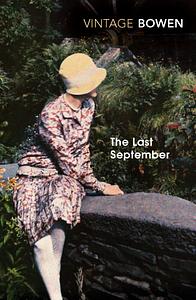Take a photo of a barcode or cover
An interesting fictional account of what life was like in Ireland during colonization and the cognitive dissonance and fatigue that submerged upon England’s arrival. I say cognitive dissonance and fatigue specifically in reference to the character’s attitudes towards the British soldiers (for example, inviting them to tennis parties and getting romantically involved when the English are there to force them into oppression) but it is prevalent as well in their attitudes towards the war itself. I gave this book two stars for the aforementioned qualities but only three stars because it was a bit of a drag and I would likely have DNF’d it had I not been forced to read it for school.
I know that the point of the book is that the ordinary life of the upper class goes on barely disturbed in the midst of revolution, but that ordinary life is so staggeringly boring that I was too annoyed with the book to appreciate that point.
At times, a quite poetic work. The dialogue seems to be always some puzzle to be worked out. A floating feeling seems to be present throughout the novel - maybe that is only true for me though. Overall, a good book throughout which the reader can really feel the tensions of changing times.
One of those very quiet books, though set in a tumultuous time. It's Ireland in 1920, after the Great War but right smack dab in the middle of the "troubles." I think I would have enjoyed this book much more if I knew more about Irish history, but it also wasn't quite a good enough book to make me want to go read up on Irish history.
It's a drawing room drama. People visit, soldiers are flirted with, plans for the future are made and then ruined. Parts of it are hysterical, but I also found myself rereading sentences occasionally. I also discovered this is not a book to be read before bed, but one for when you're fully awake.
I think this is one of those books you have to be in the mood for, and for the first half of the book, I just wasn't.
It's a drawing room drama. People visit, soldiers are flirted with, plans for the future are made and then ruined. Parts of it are hysterical, but I also found myself rereading sentences occasionally. I also discovered this is not a book to be read before bed, but one for when you're fully awake.
I think this is one of those books you have to be in the mood for, and for the first half of the book, I just wasn't.
The individual sentences and sentiments were often just stunningly beautiful and insightful. Such a dense book, it took me ages to read. I’m glad I did.
emotional
reflective
slow-paced
These characters can't even speak in complete sentences. If the English in Ireland were actually like them, it's no wonder colonial rule ended.
Also, I am not taking any more recommendations for books about Ireland from the Guardian.
Also, I am not taking any more recommendations for books about Ireland from the Guardian.
reflective
sad
slow-paced
challenging
reflective
slow-paced
Plot or Character Driven:
Character
Strong character development:
Complicated
Loveable characters:
Complicated
Diverse cast of characters:
No
Flaws of characters a main focus:
Yes
Written in 1928, about the Ireland of 1920: the word last in the title is very important, though subtly explored through the story. The central characters are an Anglo-Irish family, the Naylors, who have lived in Co. Cork, in a 'Big House', for generations. The country is full of British troops, attempting to quash the IRA: a guerrilla war is underway, but the Naylors and Anglo-Irish families like them are doing their best to ignore this. This is the atmosphere in which Lois is spending her summer: she has just left school, and, an orphan, lives with her aunt and uncle. Lois, like the Naylors, is coping with the war by pretending it isn't happening: she sees herself as Irish, and is frustrated by the British soldiers, but also goes to dances with them, plays tennis with them, and begins to form attachments to them.
In this novel, Bowen cleverly and subtly explores Lois's naivete against the background of the Anglo-Irish's detemination not to see what is happening, and her lost innocence against the loss of a particular way of life and kind of people. She points out the hypocrisy of both the Anglo-Irish and the British troops, and does not seem to be on anyone's side: instead she captures the atmosphere of this hot, dangerous September in a country that is in the middle of turmoil.
Bowen's writer is astute and poignant, but often very funny. She uses witty, almost surreal details, and captures the absurdity of day-to-day life, as well as people's personal quirks. I rarely type out quotes from novels, but this paragraph, describing a dinner party, amused me so much I wanted to quote it here. I couldn't bear to cut it down: it describes an old Anglo-Irish house holder at supper with his daughter, Livvy, and her friend, Lois, and two officers from the army:
Highly recommended: a very accomplished novel, but also a sensitive and funny one.
In this novel, Bowen cleverly and subtly explores Lois's naivete against the background of the Anglo-Irish's detemination not to see what is happening, and her lost innocence against the loss of a particular way of life and kind of people. She points out the hypocrisy of both the Anglo-Irish and the British troops, and does not seem to be on anyone's side: instead she captures the atmosphere of this hot, dangerous September in a country that is in the middle of turmoil.
Bowen's writer is astute and poignant, but often very funny. She uses witty, almost surreal details, and captures the absurdity of day-to-day life, as well as people's personal quirks. I rarely type out quotes from novels, but this paragraph, describing a dinner party, amused me so much I wanted to quote it here. I couldn't bear to cut it down: it describes an old Anglo-Irish house holder at supper with his daughter, Livvy, and her friend, Lois, and two officers from the army:
Mr Thompson did not entertain very much, but Lois remembered once staying to supper there, early that summer, with David and Gerald. [...] Mr Thompson's dining-room looked out on to trees, that fanned little gusts of light over the table then closed again in green darkness; it smelt of meat and there was an enormous pilastered mahogany sideboard like the front of a temple, inside which they could hear mice running about. Mr Thompson was silent - from fear, they thought, rather than disapproval - he kept drawing long black horsehairs from the seat of his chair and laying them out on the cloth. At each hair, David and Gerald leaned forward and opened their mouths to speak. But Mr Thompson went down in his collar so that they could not: they spoke to each other. And Lois, looking under her lids, had marvelled at this fortress of many opinions. His sister Miss Thompson was present, but she was deaf. The dining-room was dark red, with a smoky ceiling, and Gerald said afterwards he had felt like a disease in a liver. When the blancmange came in it lay down with a sob and Miss Thompson frowned at it. 'Death of the cow,' thought Lois, and saved this up. Livvy kept looking warningly at her friends, but they were all polite. Some ducks filed in a the French window; the guests flapped with their napkins, but Mr Thompson said, 'Oh, let them be,' and sure enough the ducks went round the table with their usual urgent look and out by the window again. Mr Thompson got up and shut out the May air. 'Times change for the worse,' he said to Gerald, who agreed with him so emphatically that David had to repeat the interchange to the anxious Miss Thompson. No wonder Livvy found home dull.
Highly recommended: a very accomplished novel, but also a sensitive and funny one.



